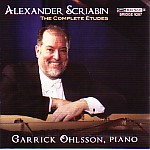Recorded in 2004 yet only released in 2009, Garrick Ohlsson’s traversal of the complete Scriabin Etudes features a vintage 1876 Steinway Style 4 Concert Grand. The instrument’s overall sweet tone, pronounced timbral distinction between registers, and wide capacity for nuance inspires some of this pianist’s finest recorded work to date. In contrast to the speed, lightness, and surface symmetry characterizing Piers Lane’s Etudes cycle (Hyperion), Ohlsson favors more rubato and weightier textures, plus inner voices that murmur more than they smolder. Pedaling sparely, Ohlsson wields a pearly legato touch that fashions effortless long lines out of Op. 8 No. 6’s difficult right-hand double notes, Op. 42 No. 2’s scurrying left-hand countermelody, and Op. 65 No. 1’s pianissimo right-hand major ninths. Op. 8 No. 12 (the one Horowitz made famous) projects intense sustaining power that transcends producer Adam Abeshouse’s slightly boxy sonics. And while the trills in Horowitz’s “Mosquito” Etude (Op. 42 No. 3) sting, Ohlsson’s tickle! Malcolm MacDonald’s booklet notes more than rise to Ohlsson’s thoughtful and stylistically simpatico virtuosity. Highly recommended.
































